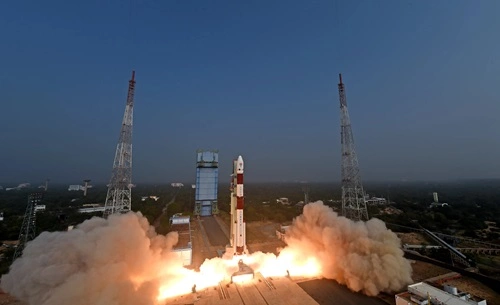In a significant milestone for India’s burgeoning private space sector, three Indian startups—Pixxel, Digantara, and XDLINX Space Labs—have successfully launched advanced satellites aboard SpaceX’s Transporter-12 mission. The launch took place from Vandenberg Space Force Base in California, USA, at 19:15 GMT on January 15, 2025 (00:45 IST on January 16).
Pixxel’s Firefly Constellation: Pioneering Hyperspectral Imaging

Pixxel, a Bengaluru-based space-tech startup, deployed the first three satellites of its Firefly constellation, marking India’s inaugural private satellite network. These satellites are equipped with cutting-edge hyperspectral imaging technology, offering a 5-meter resolution—six times sharper than the standard 30-meter resolution of existing hyperspectral satellites. This advancement enables the capture of detailed data across numerous light bands, facilitating applications in agriculture, mining, environmental monitoring, and defense.
Awais Ahmed, founder and CEO of Pixxel, expressed enthusiasm about the achievement: “The successful deployment of our first commercial satellites is a defining moment for Pixxel and a giant leap toward redefining how we use space technology to address the planet’s challenges.” The company plans to launch three additional Firefly satellites in the second quarter of 2025, aiming to expand its constellation to 24 spacecraft in the coming years.
Digantara’s SCOT: Enhancing Space Situational Awareness
Digantara, another Bengaluru-based startup, launched its SCOT (Space-based Space Surveillance and Tracking) satellite, designed to enhance space situational awareness by monitoring space objects and debris. This capability is crucial for ensuring the safety of space operations, given the increasing congestion in Earth’s orbit. Digantara’s technology provides real-time tracking and collision avoidance data, contributing to the sustainability of space activities.
XDLINX Space Labs’ ELEVATION-1: Advancing Communication Technologies
XDLINX Space Labs facilitated the launch of ELEVATION-1, a satellite developed in collaboration with the U.S.-based Almagest Space Corporation. This mission focuses on testing and validating E-band communication technologies, which promise to significantly enhance data transmission rates for satellite communications. The successful deployment of ELEVATION-1 positions XDLINX at the forefront of next-generation communication solutions in the space industry.
Implications for India’s Private Space Sector
The successful deployment of these satellites underscores the growing capabilities and ambitions of India’s private space sector. Historically dominated by the state-run Indian Space Research Organisation (ISRO), the Indian space landscape is witnessing increased participation from private entities, spurred by supportive government policies and a global surge in demand for space-based services.
These developments align with India’s goal to expand its share in the global commercial space market, which is projected to reach $19 billion by 2029. Currently, India holds a modest 2% share, but the advancements by startups like Pixxel, Digantara, and XDLINX indicate a trajectory toward greater participation and innovation in the international arena.
Future Prospects and Challenges
As these startups continue to develop and deploy advanced satellite technologies, they contribute to a more robust and diversified space ecosystem in India. However, challenges remain, including the need for substantial investment, regulatory navigation, and competition from established global players.
The Indian government’s ongoing support, coupled with the entrepreneurial spirit of these startups, suggests a promising future for India’s private space endeavors. The successful launches via SpaceX not only demonstrate technical prowess but also signify India’s readiness to collaborate on international platforms, further integrating into the global space community.
In conclusion, the achievements of Pixxel, Digantara, and XDLINX Space Labs mark a pivotal moment in India’s space journey, reflecting the nation’s transition from a state-centric model to a dynamic, private sector-driven paradigm. As these companies scale new heights, they pave the way for innovative applications that can address both national and global challenges through space technology.
Santosh Kumar, the author behind IndiasStuffs.com, is passionate about sharing valuable insights on a variety of topics, including lifestyle, technology, and Indian culture.
Page Contents

